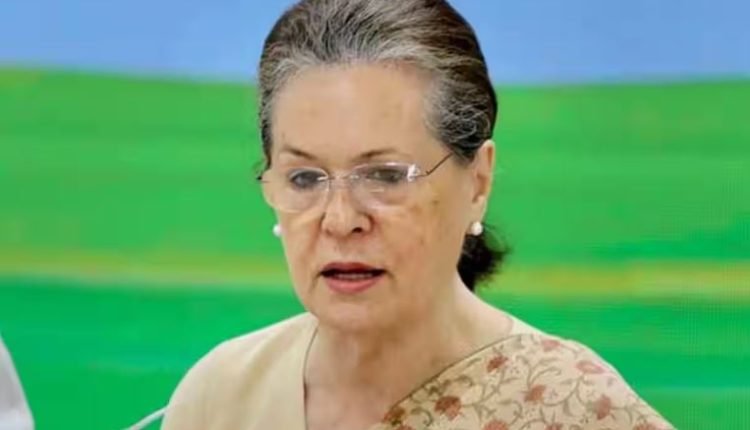Sonia Gandhi calls for khadi revival as sole fabric for tricolor, slams adoption of machine-made polyester flags
Khadi embodies national pride, should be sole tricolor fabric: Sonia Gandhi decries polyester flag trend
New Delhi, Aug 2024: Congress leader Sonia Gandhi has strongly criticized the Modi government for its widespread adoption of machine-manufactured polyester flags, calling for the restoration of khadi as the sole fabric for the Indian tricolour. Writing in The Hindu, Gandhi emphasized the significance of khadi as an embodiment of national pride and urged for its rightful place as the only fabric worthy of bearing the national flag. She noted that Prime Minister Narendra Modi’s renewed push for the ‘Har Ghar Tiranga’ campaign leading up to Independence Day provides a moment to reflect on the national flag’s importance and symbolism for the nation.
Gandhi pointed out the inherent contradiction in Modi’s reverence for the national flag while being loyal to an organization historically indifferent to it. She expressed her concern about the government’s endorsement of machine-made polyester flags, often produced with raw materials imported from countries like China. She highlighted that the Flag Code of India has traditionally mandated the national flag to be made of “hand-spun and hand-woven wool/cotton/silk khadi bunting,” a fabric with deep historical and cultural significance. Gandhi underscored that khadi, which was championed by Mahatma Gandhi during the independence movement, remains a symbol of India’s rich past and a beacon of modernity and economic vitality.
Gandhi lamented that the tricolour once proudly displayed the Mahatma’s charkha at its center, with khadi as its sole fabric. However, she criticized the government’s 2022 decision to amend the Flag Code to allow machine-made polyester bunting and exempt such flags from the Goods and Services Tax (GST), putting them on the same tax footing as khadi flags. She argued that instead of reaffirming the nation’s commitment to its symbols, the government chose to prioritize mass-produced polyester flags over khadi.
Drawing attention to the plight of khadi workers, Gandhi mentioned the indefinite strike by the Karnataka Khadi Gramodyoga Samyukta Sangha (KKGSS) in Hubballi, the country’s sole BIS-accredited national flag manufacturing unit, as a protest against the state-sponsored decline of the khadi industry. She pointed out that India, once a global leader in polyester manufacturing, became a net importer of polyester yarn in 2023 and 2024. This, she said, is a tragic reversal of national pride, especially given the ongoing tensions with China, a major supplier of polyester yarn.
Gandhi criticized the government for its lack of vision and support for khadi spinners and weavers, the true heirs of Mahatma Gandhi’s legacy. She argued that the government’s approach to the national flag issue is symptomatic of its broader disregard for India’s handloom and handicraft traditions, including khadi. Since 2014, she claimed, the government has consistently supported big corporate interests at the expense of micro, small, and medium enterprises, which are the backbone of India’s handloom industry. She cited demonetization, a punitive GST, and the poorly managed COVID-19 lockdown as factors that have driven thousands of handloom workers out of their professions, unraveling India’s rich handloom heritage.
Gandhi further criticized the GST as a burden on handloom workers, with taxes imposed on both final products and raw materials such as yarns, dyes, and chemicals. Despite workers’ repeated demands for GST exemption, the government has remained unsympathetic, while rising costs, particularly for electricity and cotton fiber, have squeezed the industry.
She also pointed out that the recently launched Vishwakarma Yojana, which is already lacking in several aspects, completely excludes handloom spinners and weavers. Moreover, the government has made no effort to empower khadi workers to form cooperatives outside of existing institutions to market their products. Government procurement of khadi has also declined, with departments often ignoring mandates to support the industry.
Gandhi expressed disappointment that the government has failed to build a global market for Indian handlooms, even as global consumers increasingly value sustainable sourcing and fair trade. She argued that khadi, which was central to Mahatma Gandhi’s satyagraha, should be cherished globally, but instead, it is being neglected even within India. The market has become unregulated, with khadi spun from semi-mechanized charkhas being sold under the same label as traditional hand-spun khadi, harming the livelihoods of khadi spinners who earn meager wages despite their hard work.
In her article, Gandhi called for urgent action to restore khadi to its rightful place as the sole fabric for the Indian tricolour and to protect the heritage and livelihoods of India’s khadi workers.
#KhadiForTricolor #NationalPride #SoniaGandhi #KhadiRevival #HandloomHeritage #IndependenceDay #TricolorTradition #SayNoToPolyester #SupportKhadi #MahatmaGandhiLegacy #ProtectKhadi #BapuKiKhadi




